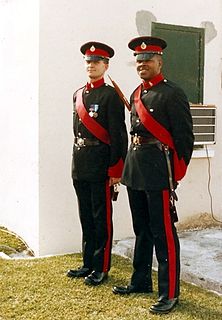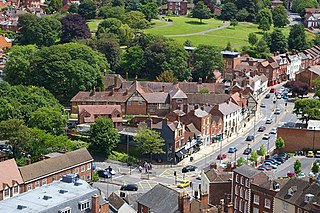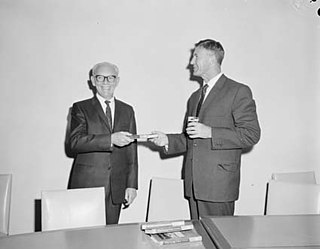Clinton is an English toponymic surname, indicating one's ancestors came from English places called Glympton or Glinton. Clinton has frequently been used as a given name since the late 19th century. Baron Clinton is a title of peerage in England, originally created in 1298.

The Most Excellent Order of the British Empire is a British order of chivalry, rewarding contributions to the arts and sciences, work with charitable and welfare organisations, and public service outside the civil service. It was established on 4 June 1917 by King George V and comprises five classes across both civil and military divisions, the most senior two of which make the recipient either a knight if male or dame if female. There is also the related British Empire Medal, whose recipients are affiliated with, but not members of the order.
Sir is a formal English honorific address for men, derived from Sire in the High Middle Ages. Traditionally, as governed by law and custom, Sir is used for men titled knights i.e. of orders of chivalry, and later also to baronets, and other offices. As the female equivalent for knighthood is damehood, the suo jure female equivalent term is typically Dame. The wife of a knight or baronet tends to be addressed Lady, although a few exceptions and interchanges of these uses exist.

The company sergeant major (CSM) is the senior non-commissioned soldier of a company in the armies of many Commonwealth countries, responsible for administration, standards and discipline. In combat, his prime responsibility is the supply of ammunition to the company. He also oversees the distribution of other supplies, such as water or food, although that responsibility is mainly that of the company quartermaster sergeant (CQMS), and evacuating the wounded and collecting prisoners of war.
Murray is both a Scottish and an Irish surname with two distinct respective etymologies. The Scottish version is a common variation of the word Moray, an anglicisation of the Medieval Gaelic word Muireb ; the b here was pronounced as v, hence the Latinization to Moravia. These names denote the district on the south shore of the Moray Firth, in Scotland. Murray is a direct transliteration of how Scottish people pronounce the word Moray. The Murray spelling is not used for the geographical area, which is Moray, but it became the commonest form of the surname, especially among Scottish emigrants, to the extent that the surname Murray is now much more common than the original surname Moray. See also Clan Murray.
Gow is a Scottish surname. The name is derived from the Gaelic gobha, meaning 'smith'. The name is represented in Scottish Gaelic as Gobha.
Hogg is a Scottish or Irish surname.
Pascoe is a Cornish given name and surname which means "Easter children" from the Cornish language Pask, cognate of Latin Pascha ("Easter"). Pascoe is a Cornish pet form of name Pascal, introduced by the Norman knights into England after the Conquest started in 1066, and derives from the Latin paschalis, which means "relating to Easter" from Latin Pascha ("Easter"). Alternative spellings are Pasco, Pascow and Pascho. Pascoe is the most common Cornish name.
The surname Hurley has become the English version of at least three distinct original Irish names: the Ó hUirthile, part of the Dál gCais tribal group, based in Clare and North Tipperary; the Ó Muirthile, from the environs of Kilbrittain in west Cork; and the Ó hIarlatha, from the district of Ballyvourney, also in Cork, whose name is more usually anglicised "(O')Herlihy". The principal concentrations of Hurleys are today found in counties Tipperary and Limerick, where they spread from the original Dalcassian homeland, and in Cork. An interesting example of the pseudo-translation of surnames is found in Clare, where some whose name was originally Hurley have now adopted the surname "Commane", since the Irish for the hurley-stick used in the sport of hurling is camán while the name "Commane" does not originate from that source.
Cowell is a surname with multiple origins.

Thomas Wylde was an English politician and administrator. His residence was The Commandery, Worcester.
Torrens is the surname of:
Ernest Malcolm Fewtrell was a Detective Chief Superintendent in the Buckinghamshire Constabulary and head of Buckinghamshire CID. He led the initial investigation into the Great Train Robbery in 1963.
Maximilian Fewtrell is a British racing driver, member of the Renault Sport Academy and 2016 British F4 champion. He will compete in the 2020 FIA Formula 3 Championship for Hitech Grand Prix alongside Kiwi Liam Lawson and Norwegian Dennis Hauger, having driven for ART Grand Prix in the 2019 season. He is brother to Theo Fewtrell.
Charlton is an English-language masculine given name that may refer to:
The 2018 Formula Renault Eurocup is a multi-event motor racing championship for open wheel, formula racing cars held across Europe. The championship features drivers competing in 2 litre Formula Renault single seat race cars that conform to the technical regulations for the championship. The 2018 season is the 28th Formula Renault Eurocup season organized by the Renault Sport and the third season as the main category of the World Series by Renault. The series will visit ten circuits around the Europe, including Monaco.
Major General Albert Cecil Fewtrell, was an Australian railway engineer and a senior officer in the Australian Army during the Second World War.
Tighe is an Irish surname, derived from the Old Gaelic O Taidhg. Notable persons with that name include:

Lionel Gage Wigmore was an Australian journalist and military historian. He was an author of a number of books on aspects of Australian history, including one of the volumes of the official history series Australia in the War of 1939–1945.

The 2020 FIA Formula 3 Championship is the eleventh season of the third-tier of Formula One feeder championship and also second season under the moniker of FIA Formula 3 Championship, a multi-event motor racing championship for single-seat open-wheel formula racing cars. The championship features drivers competing in three-point-four litre Formula 3 racing cars which conform to the technical regulations, or formula, of the championship. It is due to run in support of the Formula 1 World Championship and its sister series, Formula 2. It serves as the third tier of formula racing in the FIA Global Pathway.




